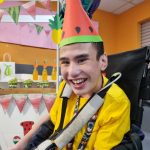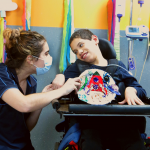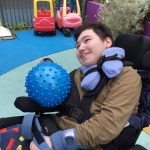Dysphagia, or swallowing disorders, are common among children who have disabilities. Here at Allowah, it is one of the problems that a lot of our kids face. Working to improve these issues can significantly increase a child’s quality of life. One of the lesser known benefits of speech pathology is the potential it has to assist with swallowing issues. Speech pathology can help children with disabilities eat in an easier, more independent and less stressful way.
The Problem of Swallowing Disorders
Dysphagia looks different for everyone, sometimes it may present as a child coughing during feeding, significant reflux issues or simply the refusal of particular types of food. It can be caused by muscular or other physiological issues of the lips, tongue, palete, oesophagus or upper aero-digestive tract. The well-being of children with these issues is significantly affected as they struggle to maintain healthy diets, eat consistently, gain nutrients or enjoy the act of eating.
Why Speech Pathology?
Speech pathologists are clearly well known for their ability to improve issues regarding verbal communication. But, their expertise in the anatomy of the face, mouth and throat, means that they are the perfect people to tackle swallowing issues. Speech pathologists have in depth knowledge as to the structure and functions of specific parts of oral cavities and muscles and can, therefore, help with the diagnosis and treatment of dysphagia.
Diagnosis
Speech pathologists can perform a series of tests and observations to help determine what the exact root of a swallowing problem is. These tests may include:
- Observing a child eat and watching for behaviour and posture changes.
- Observing the techniques used by carers and family members who feed the child.
- Testing for what particular foods a child reacts to.
- Looking for particular symptoms such as tight muscles, lack of muscular definition and deformities of the mouth, tongue, throat or teeth.
- Conducting a modified barium swallow test which involves the patient eating or drinking liquid with barium in it, a material which shows up in an X-Ray.
- Conducting an endoscopic assessment by inserting a lighted scope through the nose and viewing the swallowing process on a screen.
Treatment
Once a diagnosis has been made, a speech pathologist can recommend a physical therapy program and implement feeding recommendations to help alleviate swallowing issues. Depending on what the problem is, a speech pathologist may recommend different ways of serving or preparing food. Various textures or temperatures can affect the way a child who suffers from dysphagia can eat. Similarly, a speech pathologist may recommend particular postures to use during meal times. Exercises to strengthen particular muscle groups can be very beneficial in treating swallowing disorders.
Some of the results of working with a speech pathologist who specialises in swallowing can be:
- Strengthened muscles in the mouth and face.
- A more mobile tongue.
- A less stressful, physically and emotionally, feeding process.
- Improved chewing ability.
- Improved sucking or drinking ability.
- Coordinating breathing patterns to help with eating.
- Increased acceptance of food which then leads to better nutrition.
Part of a Team
The best thing about using speech pathologists to help children with dysphagia, is that they become part of a team of carers. Speech pathologists can assist parents and carers with feeding, helping them implement new food preparation techniques or recommended postures or exercises. They work closely beside the other professionals who are caring for the child to contribute to the quality of day-to-day life.
Here at Allowah, we want the kids in our care to experience the very best that life can offer them. Being able to get nutrition and joy out of the food they eat is a big part of that. We use the very best care available from the medical profession to help children with swallowing issues and speech pathology plays a significant role in that.





